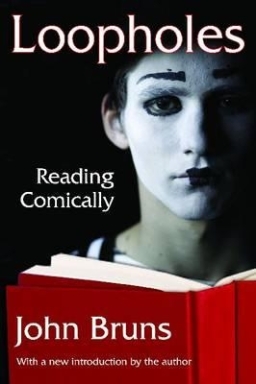Loopholes
Reading Comically
By: John Bruns
Much writing about comedy tends to begin and end with Aristotle's claim that comedy is inferior to tragedy, trivializing comedy as cheap or as a temporary distraction from things that "really matter." Such writing either presents exhaustive taxonomies of kinds of humor--like wit, puns, jokes, humor, satire, irony--or engages in pointless political endgames, moral dialogues, or philosophical perceptions. Comedy is rarely presented as a mode of thought in its own right, as a way of understanding, not something to be understood.
John Bruns' guiding assumption is that comedy is not simply a literary or theatrical genre, to be differentiated from tragedy or from romance, but a certain way of disclosing, perhaps undoing, the way the world is organized. When we view the world in terms of what is incompatible, we are reading comically. In this sense, comedy exists outside the alternatives of tragic and comic.
Loopholes argues that trivialization of comedy comes from fear that it will address our anxieties with honesty--and it is this truth that scares us. John Bruns discusses comedy as a mode of thought with a cognitive function. It is a domain of human understanding, a domain far more troubling and accessible than we care to acknowledge. To "read comically" we must accept our fears. If we do so, we will realize what Bruns refers to as the most neglected premise of comedy, that the world itself is a loophole--both incomplete and limitless.
"Bruns has given valuable support to the unique significance of comic loopholes in appreciating literature and living life. Highly recommended." --Choice "Bruns'Bakhtin-inspired study does what so few even think of doing: it takes the comic comically--as a way of understanding life in terms of 'new opportunities, new ways out in a world that has no endings, no resolutions.' Along the way, Bruns illuminates complexities of laughter, the difference between dialogue and mere interaction, the special nature of comic plots, and many other topics. In its readings and its overall approach, it will interest all who find something missing in killjoy approaches to laughter or theories that make the great humorists into what Bakhtin calls grim 'agelasts'" --Gary Saul Morson, Northwestern University "In Loopholes John Bruns challenges us to participate in unorthodox frivolity. The challenge, which proves surprisingly formidable, amounts to thinking about comedy comically, outside of bounds and disciplines in an institutional place apt to appear, if not unsettling, then a little ridiculous. What proves hardest is not to divert oneself before the start by demanding to what end. Against the sober business of comic theory, Bruns laughs off our decades-long obsession with power, of asking who exercises it, whom it exercises, and suggests more than half-seriously that the problem is less to master a joke than to lighten up, get into the spirit, enter in. Where this leaves us philosophically is what proves most interesting. In the spirit of Bahktin, Bruns recommends a reading practice characterized by subversive interaction, a studied irreverence to the given order of things. One can hardly avoid nervous laughter at the moral anarchy being flirted with here, but if you can lose your grip, the promise is an experience presently beyond our grasp: Cavell's movies without depression, James's sensibilities without detachment, Kafka's labyrinths without fear." --R. M
ISBN: 9781412852517
ISBN-10: 141285251X
Audience: General
Format: Paperback
Language: English
Number Of Pages: 200
Published: 10th October 2013
Publisher: Transaction Publishers
Dimensions (cm): 22.9 x 15.2 x 1.2
Weight (kg): 0.32
Friday, June 27, 2014
Buku-buku Humor Koleksi Ihik (164)
Subscribe to:
Post Comments (Atom)

No comments:
Post a Comment